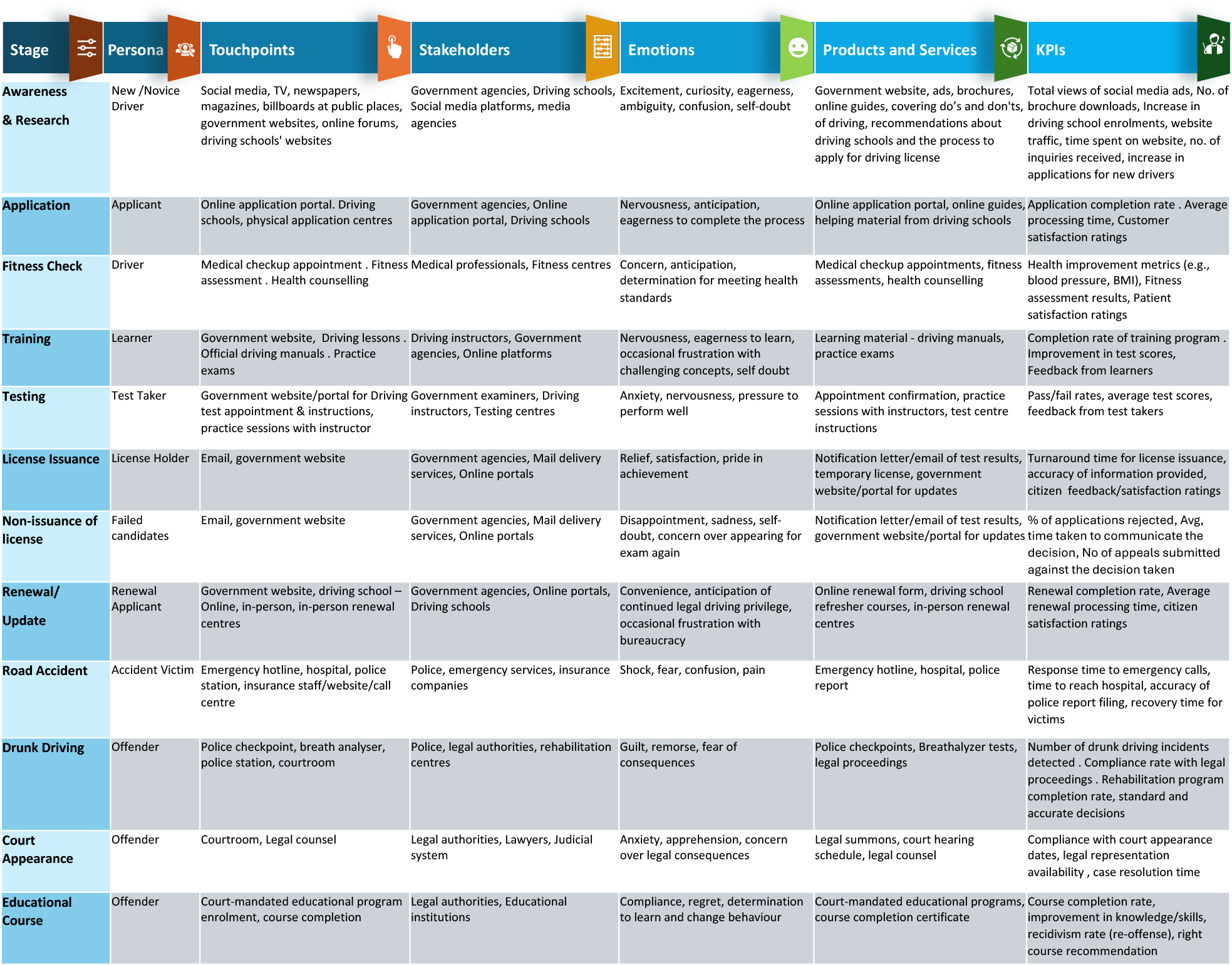Industry
Highlights
- Typically treated as individual tasks measured for completion and adherence to service level agreements (SLAs), there's a need to shift the mindset toward observing services holistically by governments.
- Some governments worldwide have started focusing on measuring outcomes rather than just outputs.
- Adopting a comprehensive and citizen-centric approach to performance measurement and project success is crucial for public sector organizations to achieve the best observability.
On this page
Introduction
Government services, often decentralized across multiple departments and entities, necessitate stakeholder collaboration to provide citizens with a seamless experience.
However, thoroughly measuring their effectiveness and quality is a challenge within this intricate ecosystem prevalent across diverse government services. Typically treated as individual tasks measured for completion and adherence to service level agreements (SLAs), there's a need to shift the mindset towards observing services holistically. This transformation is crucial for government organizations to become more citizen-centric, prioritizing the overall impact on citizens' lives over mere task completion.
Influencing factors
- Increasing expectations: As societies evolve, citizens' expectations of their governments also grow. They expect efficient and effective delivery of public services, transparency, accountability, and responsiveness to their needs. Measuring key performance indicators (KPIs) and project success allows governments to assess their performance against these expectations and identify areas for improvement.
- Aging population: Many countries are experiencing demographic shifts, with aging populations becoming a significant demographic challenge. Observing success related to healthcare, social services, pension systems, and infrastructure becomes crucial to ensure that government policies and programs adequately address the needs of older citizens and maintain their quality of life.
- Geopolitical situations: Geopolitical factors such as conflicts, geopolitical tensions, and global economic shifts can profoundly impact governments and societies. Measuring national security, economic resilience, diplomatic relations, and crisis management KPIs helps governments assess their preparedness and response to geopolitical challenges.
- Natural calamities: Events like pandemics, floods, and hurricanes can significantly disrupt societies and governments. Measuring KPIs related to public health, emergency response, humanitarian aid, and economic recovery can help governments evaluate their ability to mitigate risks, protect citizens, and restore stability in times of crisis.
- Benefits and welfare: Governments have a fundamental responsibility to ensure the welfare and well-being of citizens. Measuring KPIs related to poverty reduction, social inclusion, education, healthcare, and employment can help governments monitor progress towards achieving social and economic development goals and reducing societal inequalities.
Challenges
The inability to measure KPIs and project success can lead to several significant struggles for governments in the public sector:
- Lack of accountability: Without clear KPIs and measures of success, it becomes difficult to hold government officials and agencies accountable for their performance. This lack of accountability can erode public trust and confidence in the government.
- Inefficient resource allocation: Governments might struggle to allocate resources effectively without data-driven insights into project performance. This can result in wasted funds on projects that do not yield the intended outcomes or benefits.
- Ineffective decision-making: Without measurable KPIs, government officials might struggle to make informed decisions about policy initiatives, resource allocation, and project prioritization. This can lead to suboptimal outcomes and missed opportunities for positive impact.
- Difficulty in identifying best practices: Without clear metrics for success, it becomes challenging for governments to identify and replicate successful strategies and best practices across different projects and departments. This can hinder efforts to improve efficiency and effectiveness in delivering public services.
- Limited transparency and oversight: The inability to measure KPIs and project success can result in a lack of transparency and oversight in government operations. This can lead to concerns about corruption, mismanagement, and inefficiency, further undermining public trust in the government.
- Difficulty in demonstrating value to stakeholders: Without tangible evidence of project success, governments struggle to demonstrate the value of their initiatives to taxpayers, stakeholders, and citizens. This can hinder support for future projects and initiatives.
Overall, the inability to measure KPIs and project success can have wide-ranging implications for governments in the public sector, impacting accountability, resource allocation, decision-making, transparency, and stakeholder engagement. It underscores the importance of implementing robust performance measurement frameworks and data-driven approaches to improve governance and service delivery.
Global trends
Several key trends can be observed:
- Emphasis on outcome-based performance: Governments worldwide are increasingly focusing on measuring outcomes rather than just output. This shift involves defining clear objectives and KPIs that reflect the actual impact of government programs and initiatives on society.
| Govt. | Project scenario | KPIs | Measurement mechanisms | Success metrics |
| United Kingdom | Healthcare reform program |
|
|
|
- Utilization of data and analytics: Governments are harnessing the power of data and analytics and technology to collect, analyze, and interpret large volumes of data. This enables them to gain insights into project performance, identify trends, and make data-driven decisions for resource allocation and policy formulation.
| Govt. | Project scenario | KPIs | Measurement mechanisms | Success metrics |
| Netherlands | Sustainable transportation project |
|
|
|
- Implementation of performance management systems (PMS): Many governments are implementing PMS that integrate KPIs and metrics into decision-making processes. These systems enable continuous monitoring, evaluation, and adjustment of government programs to improve efficiency and effectiveness.
| Govt. | Project scenario | KPIs | Measurement mechanisms | Success metrics |
| Australia and New Zealand | Environmental conservation initiative |
|
|
|
- Focus on citizen-centric metrics: There is a growing recognition of the importance of incorporating citizen feedback and satisfaction metrics into performance measurement frameworks. Governments are increasingly soliciting input from citizens to assess the quality and impact of public services and initiatives.
| Govt. | Project scenario | KPIs | Measurement mechanisms | Success metrics |
| Estonia | Implementation of digital government services |
|
|
|
- Promotion of transparency and accountability: Governments are placing greater emphasis on transparency and accountability in public sector operations. This includes making performance data readily accessible to the public, enhancing transparency in decision-making processes, and holding government officials accountable for achieving results.
| Govt. | Project scenario | KPIs | Measurement mechanisms | Success metrics |
| European Union | Regional development program |
|
|
|
International benchmarking and collaboration: Governments are increasingly engaging in international benchmarking and collaboration to learn from the best practices and experiences in performance measurement and project management. This involves sharing knowledge, exchanging lessons learned, and collaborating on joint initiatives to improve governance and public service delivery globally. For e.g. across the countries, Improved access to healthcare services, better health outcomes, increased patient satisfaction, and reduced healthcare costs are some of the key indicators for better citizen experience in health services.
Overall, the global trend in the public sector is moving towards greater emphasis on outcome-oriented, data-driven approaches to performance measurement and project success. This trend reflects a growing recognition of the importance of accountability, transparency, and citizen-centricity in government operations.
Maximizing observability
Adopting a comprehensive and citizen-centric approach to performance measurement and project success is crucial for public sector organizations to achieve the best observability. This involves focusing on outcome-oriented, data-driven methodologies prioritizing accountability, transparency, and citizen satisfaction.
- Citizen journey and touchpoints: The journey towards enhanced observability begins with meticulously recording all relevant contact moments between citizens and government entities, looking into the end-to-end citizen journey. This entails identifying the initial interaction point, whether online, over the telephone, or in person. Understanding the nature of these contact moments, including the questions asked and the parties involved, forms the foundation for further analysis.
- Persona: Once these contact moments are identified, the next step is gathering citizens' feedback regarding their experiences. This feedback, obtained through user satisfaction surveys and other means, allows for creating detailed personas or benchmarks. These personas provide insights into citizen behavior and preferences, facilitating a deeper understanding of their needs and expectations.
- Emotions mapping: Emotions also play a significant role in the citizen journey, and it's essential to consider these aspects when measuring observability. By understanding citizens' emotional responses at various contact moments, governments can tailor their services to meet their needs better and enhance overall satisfaction.
- Design thinking: Governments can identify areas for improvement in the citizen journey through a combination of data analysis and design thinking methodologies, such as generating "How Can We" statements. This iterative process allows for the development of actionable solutions to remove obstacles and simplify processes.
Ultimately, the goal is to achieve 'end-to-end observability,' where every aspect of the citizen experience is measured and optimized. By prioritizing citizen satisfaction and leveraging data-driven insights, public sector organizations can enhance their performance and better serve the needs of their constituents.
Measuring is improving
The aim is 'end-to-end observability,' or the ability to measure citizen experience throughout a process. Several technical tools exist, such as a data analytics platform, real-time monitoring, and dashboards. The idea behind this is those who can measure, can improve. When it is known through measurement what the citizen wants, the government can actively provide specific services. For example, citizens can be offered apps or websites with which they can retrieve or view information themselves.

